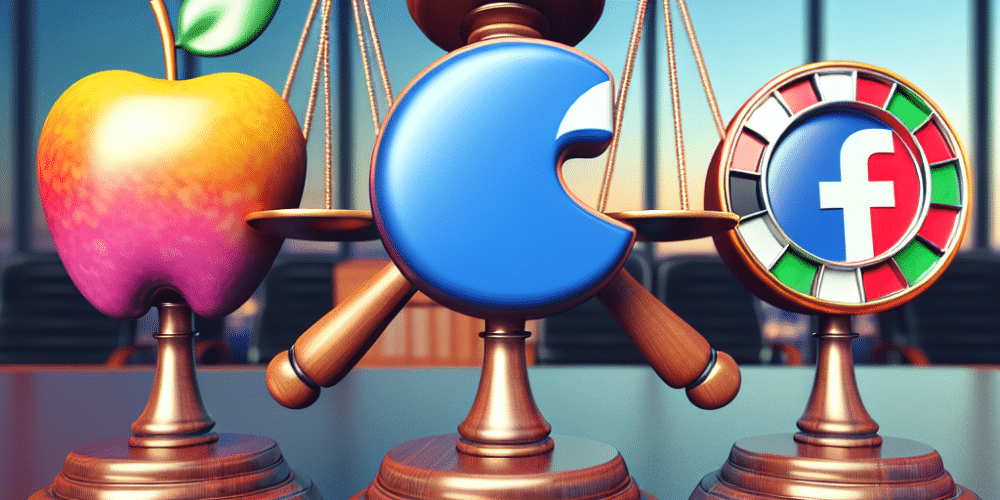On September 30, a US federal judge ruled that Apple, Google, and Meta must face class-action lawsuits accusing them of profiting from illegal gambling via casino-style mobile apps. The complaints highlight that these tech giants earned significant revenue by hosting and promoting apps that simulate gambling experiences, such as slot machines. The judge’s decision represents a significant setback for the companies, who had previously attempted to dismiss the claims by invoking protections under federal law.
The lawsuits, initially filed in 2021, argue that these companies not only hosted the apps but also facilitated transactions for in-game purchases of virtual chips, retaining approximately 30% of the proceeds. This arrangement is believed to have generated over $2 billion in revenue for the tech firms, according to the lawyers representing the claimants.
In his 37-page opinion, US District Judge Edward Davila rejected the companies’ reliance on Section 230 of the Communications Decency Act, which traditionally safeguards online platforms from being held liable for content created by third parties. Judge Davila determined that facilitating monetary transactions extended beyond the role of a neutral publisher, thereby undermining the Section 230 defense.
The thrust of the plaintiffs’ argument centers on the tech companies’ involvement in processing payments, rather than the content of the apps themselves. Judge Davila emphasized that whether the companies acted as “bookies” or “brokers” was irrelevant to the core allegations at hand.
This decision could potentially redefine the legal protections offered to tech companies under Section 230. Although Davila dismissed some claims based on individual state laws, he allowed most consumer protection claims to proceed, with the exception of those associated with California statutes. Recognizing the significance of the Section 230 issue, he also granted Apple, Google, and Meta the opportunity to appeal to the Ninth US Circuit Court of Appeals.
The lawsuits, representing dozens of app users, allege that the casino-style apps encouraged addictive gambling behavior, leading to severe consequences such as depression and suicidal thoughts. The plaintiffs seek unspecified compensatory damages, as well as treble damages and other forms of relief.
Despite the ruling, Apple, Google, and Meta have yet to make any public statements. A Google spokesperson declined to comment, and no immediate responses were received from Apple and Meta regarding the decision.
Legal analysts suggest that this ruling could have profound implications for the tech industry. For years, Section 230 has acted as a critical shield for online platforms, limiting their liability for user-generated content. Should higher courts uphold Judge Davila’s interpretation, this protection might be significantly narrowed, potentially opening the door for further legal challenges concerning the business practices of major tech corporations. The case continues in the US District Court for the Northern District of California, consolidating three separate suits against the three tech giants.
As the legal battle unfolds, it brings to light crucial questions about the responsibilities of technology companies in managing their platforms and the extent to which they can be held accountable for facilitating potentially harmful behaviors. One perspective within the industry argues that tech companies should not bear the burden of policing every piece of content or transaction on their platforms, as doing so could stifle innovation and place an overwhelming administrative load on them.
However, an opposing view suggests that when companies directly profit from activities that resemble gambling, they should indeed be held accountable for their role. Critics of the Section 230 protection say it has allowed tech companies to evade responsibility for too long, and a reevaluation of these legal shields is necessary to ensure consumer safety and corporate accountability.
The evolving nature of digital platforms and the increasing integration of real-world financial transactions within virtual environments call for a nuanced understanding of how existing laws apply. The outcome of this case could set a precedent for how courts interpret the responsibilities of tech companies, potentially influencing future litigation in similar contexts.
As this high-stakes case progresses, observers within the legal and tech communities will undoubtedly be watching closely. The decision could not only impact the operations of the involved companies but also reshape the broader landscape of legal accountability within the tech industry, prompting a reexamination of how digital platforms are monetized and regulated.

Garry Sputnim is a seasoned journalist and storyteller with over a decade of experience in the trenches of global news. With a keen eye for uncovering stories that resonate, Alex has reported from over 30 countries, bringing light to untold narratives and the human faces behind the headlines. Specializing in investigative journalism, Garry has a knack for technology and social justice issues, weaving compelling narratives that bridge tech and humanity. Outside the newsroom, Garry is an avid rock climber and podcast host, exploring stories of resilience and innovation.
















